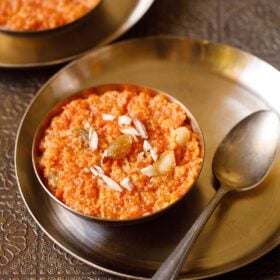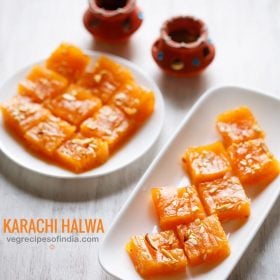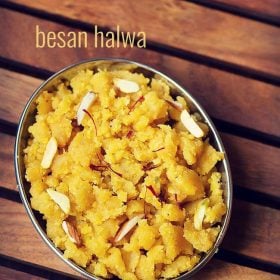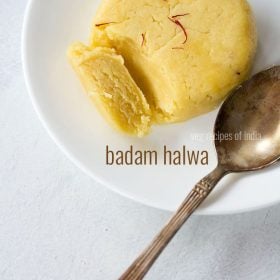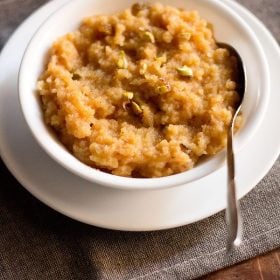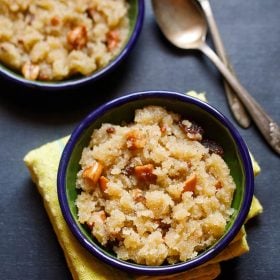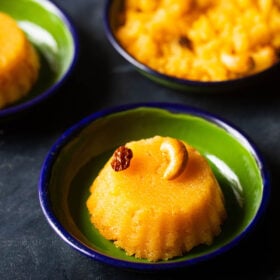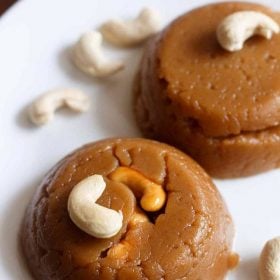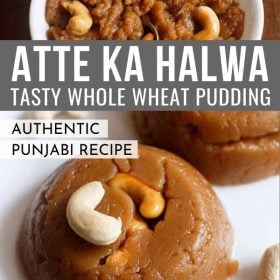Just 3 ingredients, and voila! You’ve got a scintillating and decadently gorgeous Atta Halwa. As obvious from the name, the main ingredient in this North Indian style Atta Halwa Recipe is whole wheat flour (atta). Along with this, other ingredients are generous quantities of ghee and sugar to sweeten the dessert. Which also makes this Wheat Halwa really, really melt-in-mouth and taste oh-so-good! This recipe is easy too. So, whether a special occasion, a festive celebration or just another day, this halwa is apt to add some sweetness to your day.
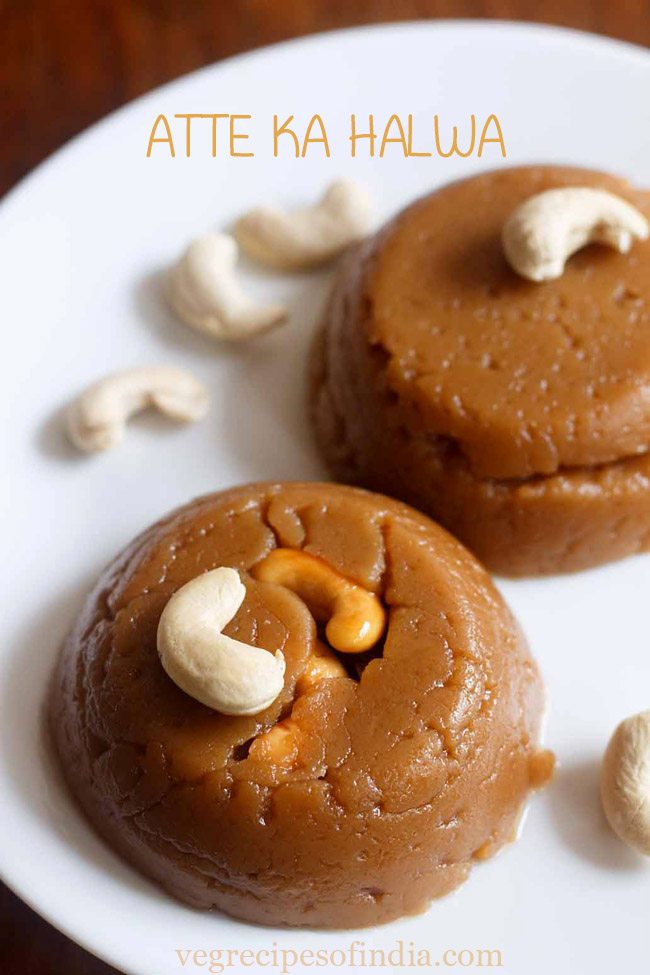
Table of Contents
About Wheat Halwa
The Atta Halwa is also a recipe that really gets quickly, within 15 minutes flat. While you are roasting the whole wheat flour, the sugar syrup gets done and comes to a rolling boil.
Later, you just add it to the golden atta with a nutty fragrance and keep stirring it till the halwa gets to a semi-thick or thick consistency. The texture of this Wheat Flour Halwa is just like the Suji Ka Halwa.
There’s another popular variation of the Wheat Halwa, called the Kada Prashad which is served in gurudwaras, not just in Punjab, but all over the world for its divine taste. This Atta Halwa Recipe results in a smooth, soft and moist textured halwa, which is the same case with the kada prashad as well.
However, you may add some dry fruits and nuts of your choice in the Atte Ka Halwa, which may not be the case with kara prashad.
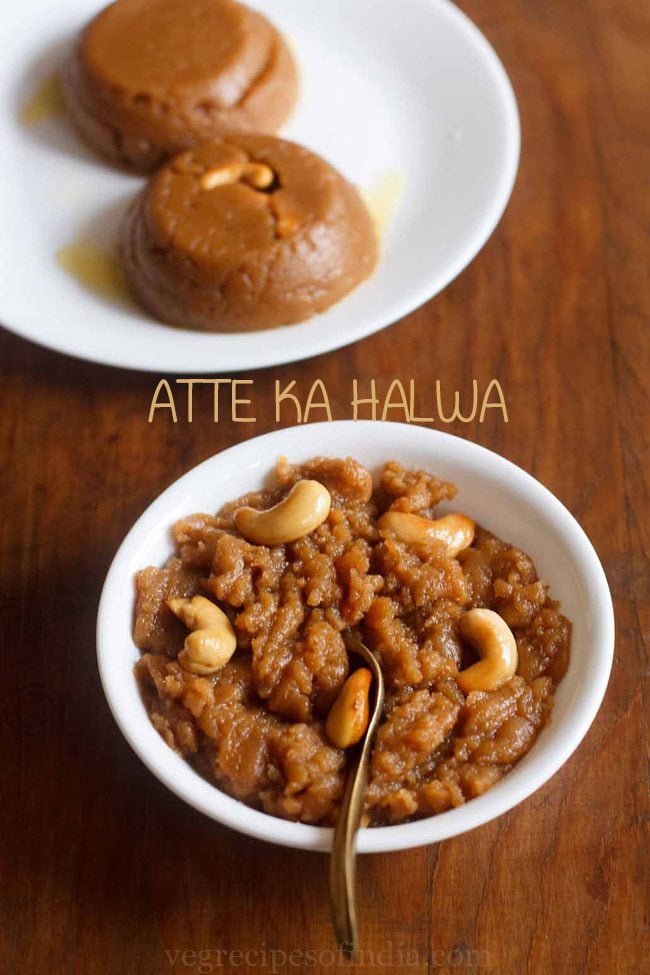
There are no flavorings added in the Atta Halwa Recipe, which gets you the best nutty flavor of the whole wheat flour only. However, you can add some rava or suji in this Wheat Halwa to give it some texture, as it is just smooth with only the atta in it.
This halwa can be served as a sweet dish after your meals. Or you can enjoy it with Poori, as halwa-poori is a brilliant combination in North India. People there also relish the suji halwa with these fried puffed breads and a sukha kala chana preparation as well.
The Atte Ka Halwa is best had hot or warm. So, if you are refrigerating the leftover halwa, then make sure to warm it before serving.
How to make Wheat Halwa
Preparation
1. Firstly measure and keep all the ingredients ready for making Atte Ka Halwa.
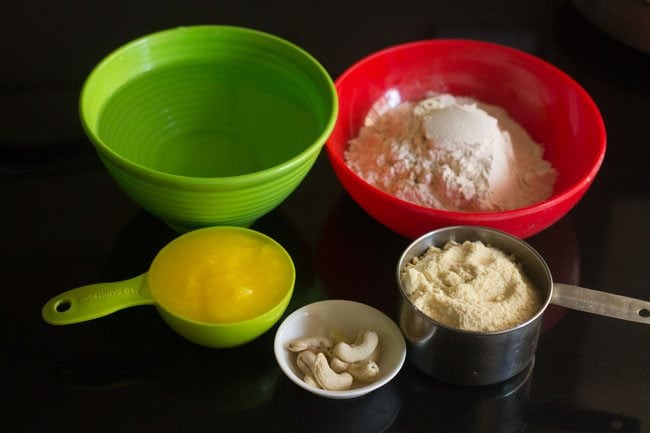
2. In a kadai or pan, add 2 cups water.
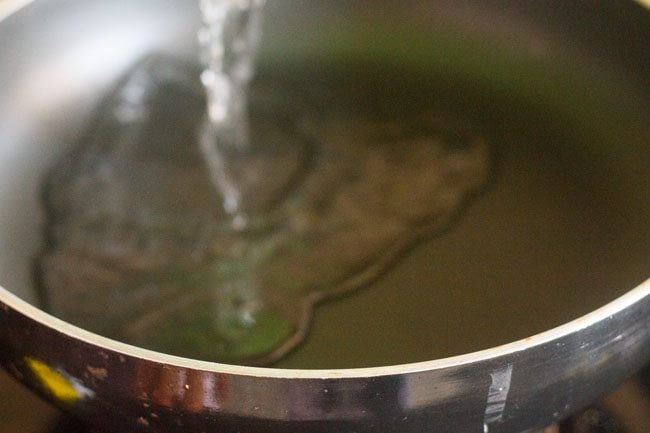
3. Next, add 1 cup of sugar. I have used organic unrefined sugar. Hence, the color is slightly golden. You can use regular white sugar or raw sugar. You can even use jaggery powder.
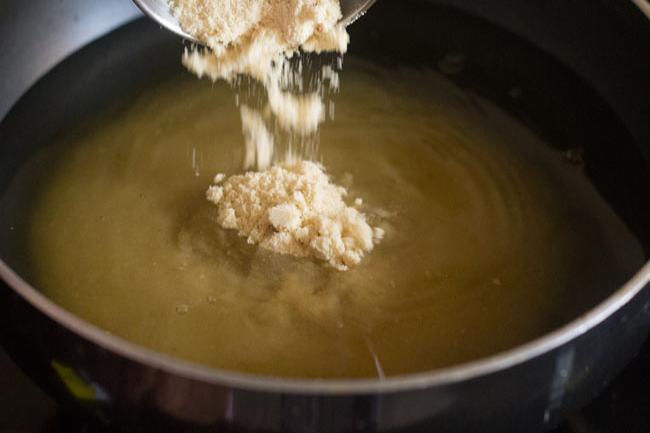
4. Heat the water and sugar. We just need to make a sugar solution.
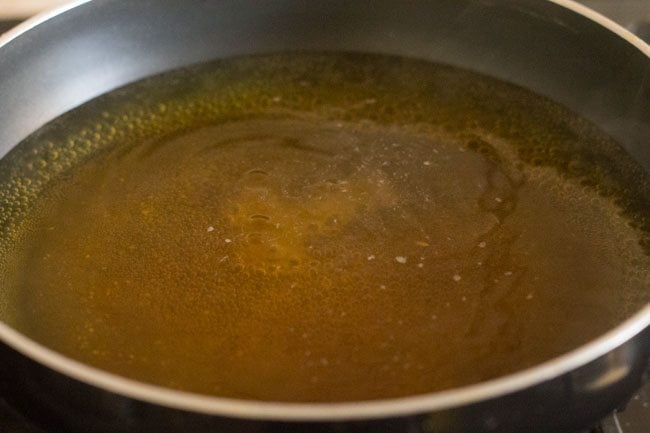
5. Let the solution come to a boil. We have to add this hot boiling sugar solution to the flour mixture once it is roasted well.
But make sure that there are no thread consistencies formed in the sugar solution. The sugar solution just needs to come to a boil.
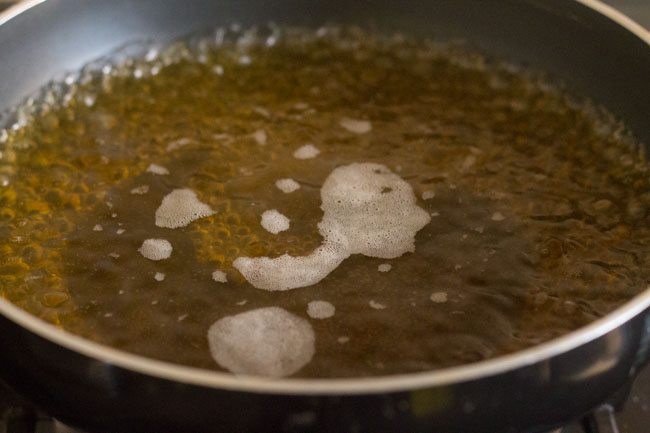
Frying cashews
6. Meanwhile, in another heavy kadai or pan, add ½ cup semi-solid ghee. Remember to use thick bottom kadai so that the atta does not get burnt.
Keep both the pan on 2 burners simultaneously. So that once the flour is roasted, the sugar solution is also hot.
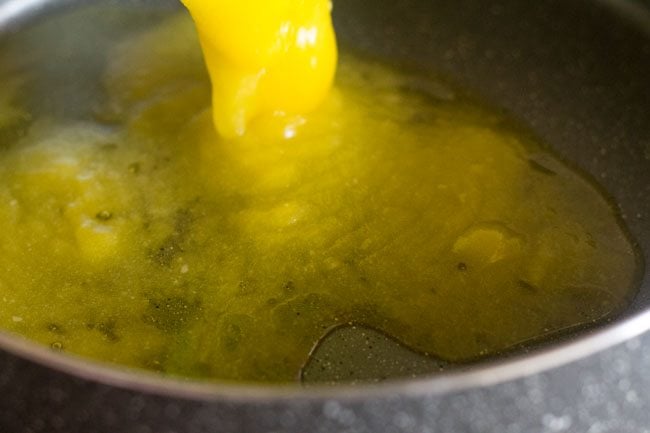
7. When the ghee becomes hot, then add 1 tablespoon of cashews. Instead of cashews, you can also add almonds to the halwa at this stage.
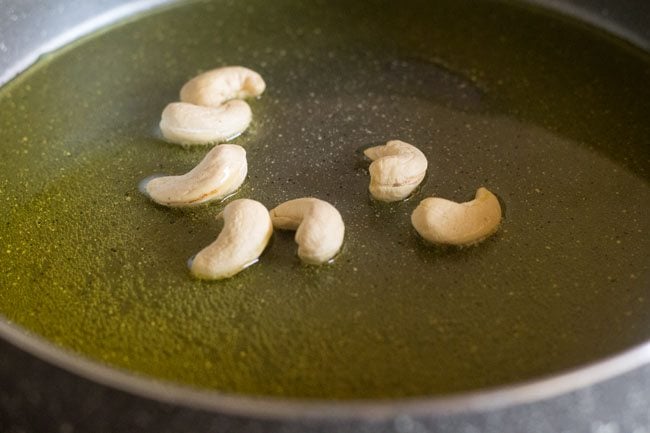
8. Fry the cashews till golden. Remove the fried cashews and keep them aside.
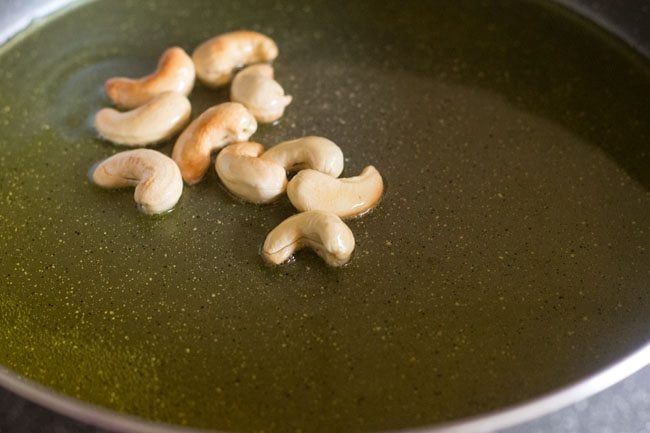
Roasting whole wheat flour
9. In the same kadai or pan, add 1 cup whole wheat flour (atta).
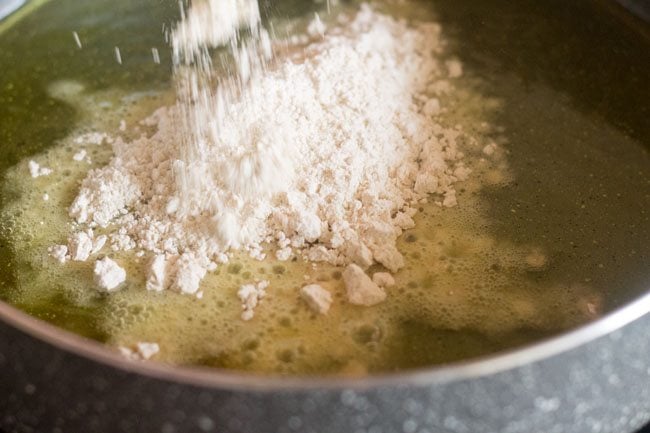
10. Stir and mix very well.
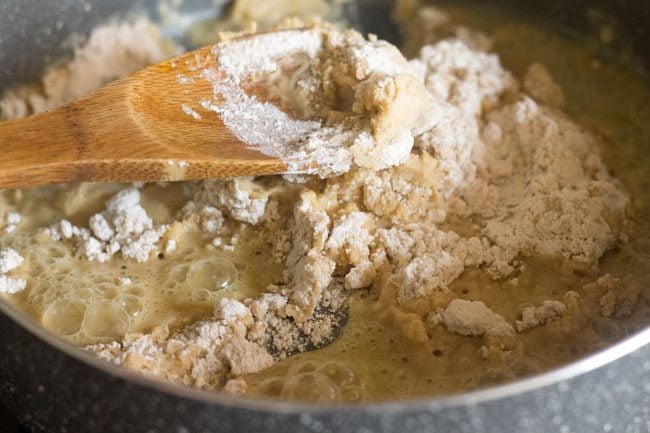
11. Roast the whole wheat flour, stirring continuously, on a low to medium-low heat till the color of the flour changes.
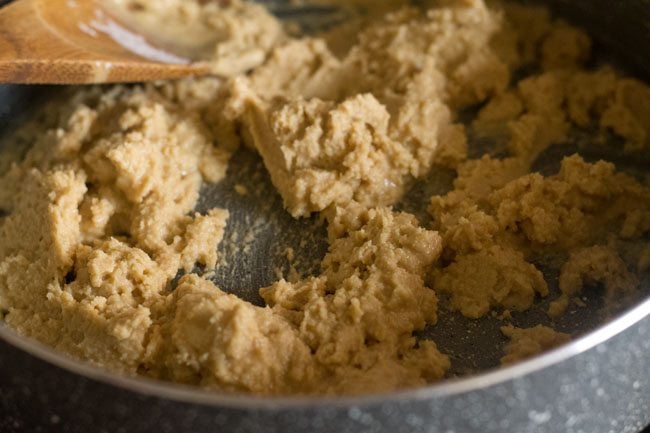
12. You will soon get the aroma of roasted whole wheat flour. Keep on stirring to ensure even browning.
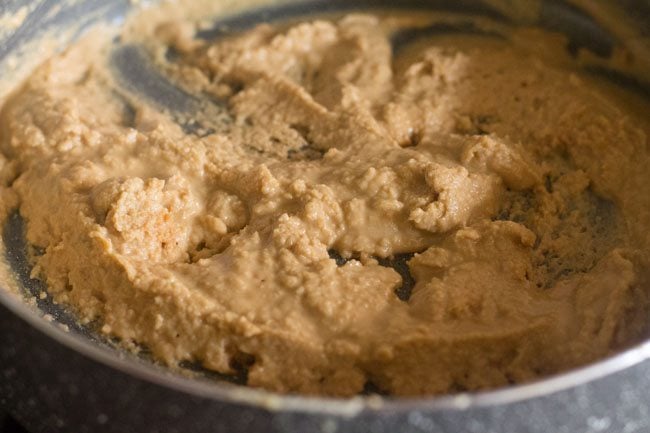
13. When the atta has turned golden, it will give a good nutty fragrance and begin to release ghee.
You will see the mixture becoming molten and flowing with ghee releasing from the sides as shown in the below photo.
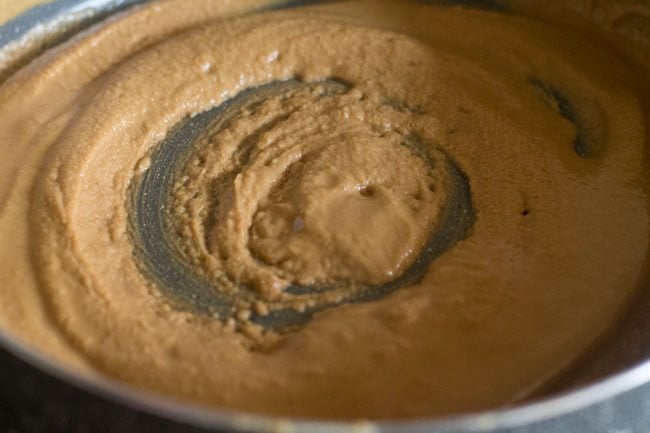
14. Then, add the bubbling hot sugar solution to the atta mixture gently. Be careful as the mixture has the tendency to splutter.
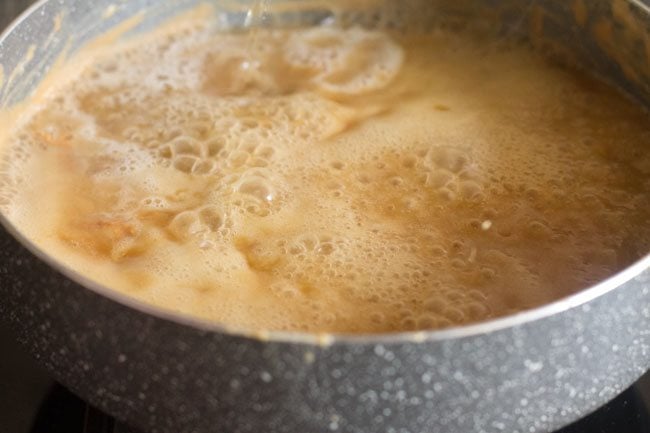
15. Continue to stir and mix very well. You cannot take a break at this step. So stir continuously. A lot of handwork is needed at this stage.
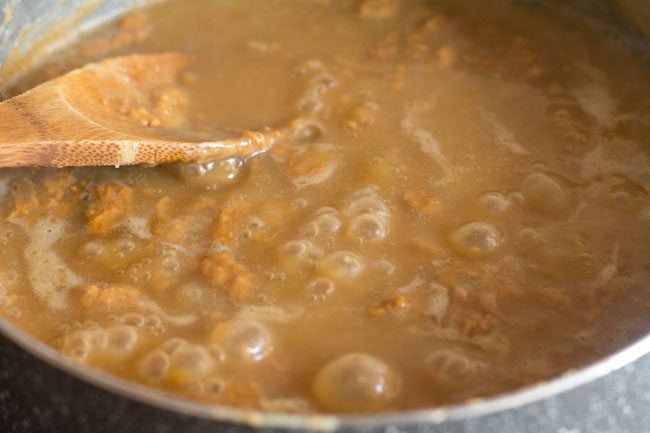
16. Keep on stirring non-stop so that lumps are not formed.
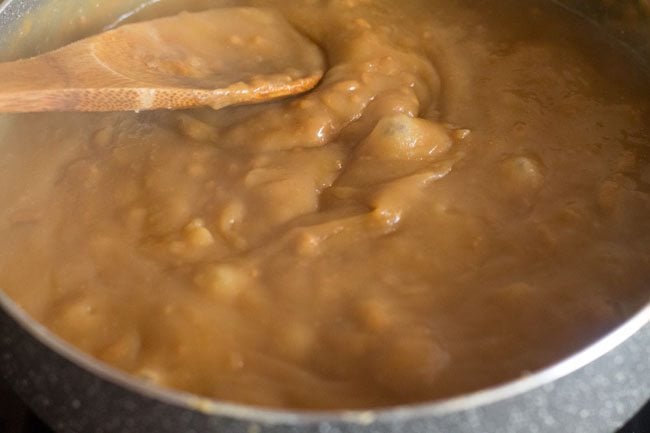
17. Next, add the fried cashews. If you want to add chopped pistachios, then you have to add them at this stage. No need to fry the pistachios before adding them.
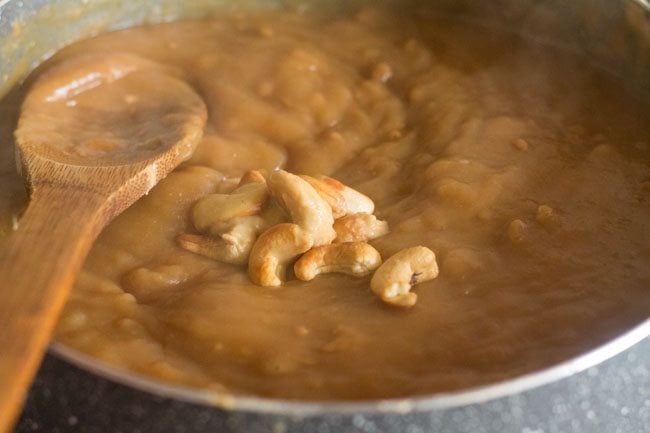
18. Keep stirring continuously. The wheat halwa will absorb water and continue to thicken quickly.
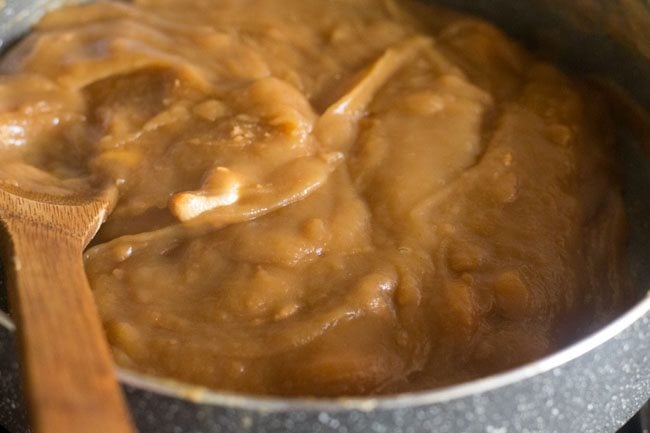
19. When the halwa consistency is semi thick or thick like a Suji ka Halwa and the ghee is also released from the sides, switch off the heat.
The photo below shows the perfect texture and consistency of the wheat halwa. It should look glossy and shiny.
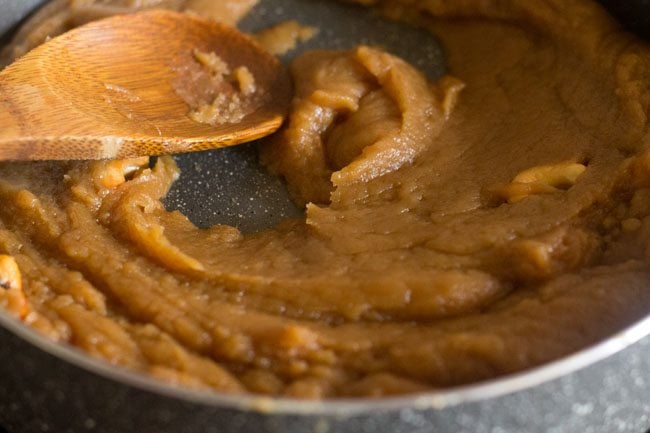
20. Serve Wheat Halwa hot or warm as a after meal sweet or dessert. You can also enjoy wheat halwa with poori.
For more delicious halwa varieties, you can check this collection of Halwa Recipes.
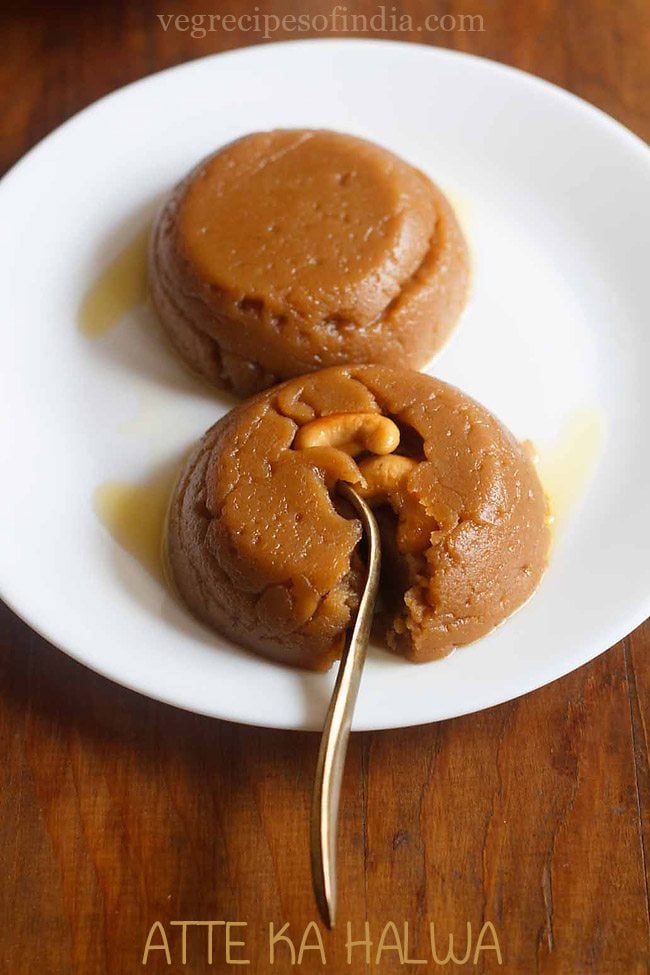
Expert Tips for Atta Halwa
- Roasting whole wheat flour: It is best to use a thick bottom kadai or pan, so that the atta does not get burnt in it and is roasted evenly. While roasting the atta, make sure to do that on low to medium-low heat. If you roast the atta on high heat, the halwa will end up tasting burnt. Keep stirring the atta continuously while roasting, for even browning.
- Sweetener: Both regular or organic sugar can be used in this halwa. Even jaggery powder works well in it.
- Sugar solution: You don’t have to cook the sugar solution to any thread consistency. It just needs to come to a boil. Also, make sure to add a bubbling hot sugar solution to the roasted atta mixture.
- Nuts and dry fruits: Instead of cashews, you can also fry almonds and add them in the halwa. If you want to add pistachios, then no need to fry them. Just add when the fried cashews are added. If you feel like adding raisins too in the halwa, add at the very end, when the halwa is almost done.
- Consistency: Switch off the heat when the halwa reaches a semi-thick, thick or a suji halwa-like consistency and ghee also is released from the sides.
- Keep both the pan on 2 burners simultaneously. So that once the flour is roasted, the sugar solution is also hot.
- Make sure to stick to these proportions of ghee to atta. Or else, your halwa will turn out to be quite dry and may not taste good.
FAQs
Recipe wise, there’s actually no difference apart from the fact that the Kada Prashad is usually plain, without any nuts or dry fruits in it. Ingredient wise Kada Prashad has more ghee than the atta halwa.
Another thing that distinguishes the two is the fact that since Kada Prashad is a prasad served in gurudwaras, it is made with a lot of devotion. Thus, automatically has a divine taste.
Of course, you can. You can add about 1 cup of grated/chopped jaggery or jaggery powder in place of the sugar. In fact, to beat the chilly winters in North India, this halwa is made with jaggery a lot of times.
You can add cashews, almonds, pistachios and even raisins in this halwa.
A lot of people do make this halwa with butter. But personally, what I would suggest, is to use ghee only in this recipe, to keep the authenticity intact.
Using ghee does make this halwa a lot richer. But you can always exercise more to burn those extra calories, rather than compromising on the flavors and originality of the dish.
More Halwa Recipes To Try!
Sweets Recipes
Halwa Recipe
Halwa Recipe
Halwa Recipe
Please be sure to rate the recipe in the recipe card or leave a comment below if you have made it. For more vegetarian inspirations, Sign Up for my emails or follow me on Instagram, Youtube, Facebook, Pinterest or Twitter.
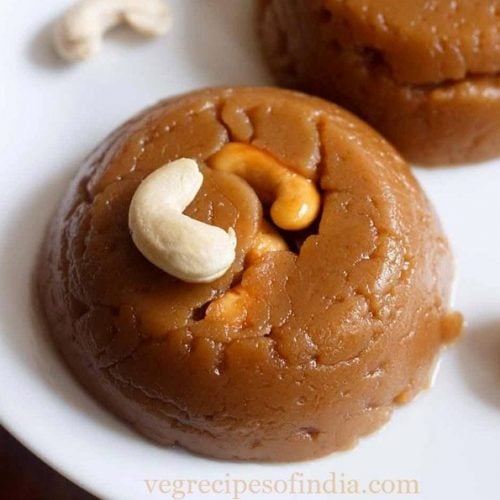
Wheat Halwa | Atta Halwa
Ingredients
- 1 cup atta (whole wheat flour)
- ½ cup Ghee (clarified butter)
- 1 cup sugar or as required
- 2 cups water
- 1 tablespoon whole cashews (kaju) – optional
Instructions
- Heat the ghee in a heavy bottomed kadai or pan.
- Add whole wheat flour to the hot ghee and start roasting it.
- Meanwhile, take sugar and water in another pan.
- Keep this pan on a medium to high flame and let the solution come to a boil.
- Fry the atta stirring continuously till its color changes and you get the aroma of roasted whole wheat flour.
- Keep on stirring the flour to ensure even browning.
- In the meanwhile keep your eyes also on the sugar solution.
- If the mixture starts to boil, then lower the flame and let it simmer.
- The atta or whole wheat flour should turn golden and give a good fragrance. Plus also begins to release ghee.
- Increase the flame to high for the sugar solution to bubble and when it starts to bubble in a matter of seconds, immediately add it to the hot atta mixture.
- Be careful as the mixture has the tendency to splutter.
- Continue to stir with all your hand force, so that no lumps are formed.
- Atte ka halwa will absorb water and continue to thicken quickly.
- Keep on stirring. So that lumps are not formed.
- When wheat halwa is semi thick or thick like a sooji halwa, switch off the fire.
- Serve atte ka halwa hot or warm.
Notes
Few tips for making atta ka halwa recipe:
- The sugar solution needs to be hot when you add it to the roasted atta mixture.
- There are no thread consistencies formed in the sugar solution. The sugar solution just needs to come to a boil.
- Use thick bottom kadai so that the atta does not get burnt.
- You can use regular sugar or organic sugar. You can even use jaggery powder.
- If you want to add kishmish (raisins) then add at the very end when the halwa is almost done.
- Instead of cashews you can also add almonds in the halwa. You will need to fry the almonds just like we have fried cashews.
- If you want to add pista (pistachio), then add them where you have added fried cashews in halwa mixture. No need to fry pista, they can be added directly.
- Keep both the pan on two burners simultaneously. So that once the flour is roasted, the sugar solution is also hot.
- Roast the atta on a low to medium-low flame.
Nutrition Info (Approximate Values)
This Wheat Halwa Post from the blog archives, first published in November 2013 has been republished and updated on December 2022.
